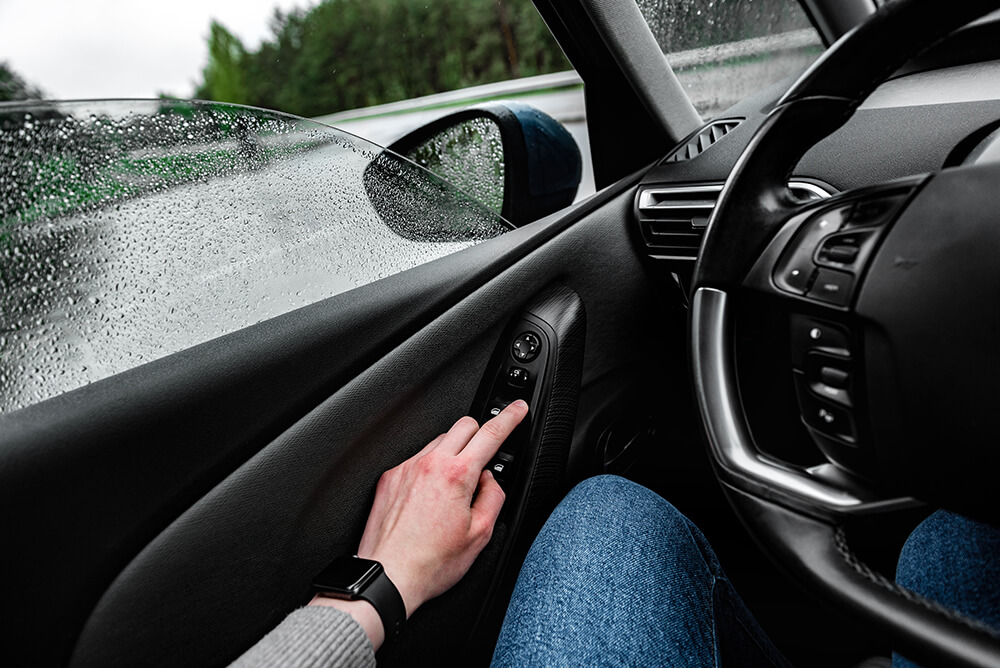Are you noticing squeaky sounds coming from your car windows every time you roll them up? It’s most likely an issue with dry or misaligned window tracks. While this may seem like a minor issue, it’s often an early sign of wear that could lead to full power window failure if left unchecked.

In this blog, you’ll learn how to stop your car windows from squeaking, what causes slow or stuck windows, and how to prevent costly power window repairs down the road.
The 3 Most Common Causes of Car Window Issues
Hearing your window squeaking when rolling it down is a clear indication that a component within the window system is not functioning as intended. In most cases, the root cause can be traced to one of three common mechanical issues—all of which, if left unresolved, can lead to complete power window failure.
- Worn or Dirty Window Tracks and Seals
Over time, debris, dust, and weather exposure can build up in the window tracks or dry out the rubber seals. This creates friction between the window glass and its guide channels, resulting in that familiar squeaking sound. Without proper cleaning and lubrication, the added resistance can eventually strain the window motor and damage internal components.
- Aging Window Motor
An aging motor may lack the force to push the window against increased friction, causing slow or jerky movement. If your window starts lagging or stops halfway, it may be time to have the motor inspected and replaced by a qualified technician.
- Faulty Regulator or Switch
The regulator is the component that controls the up-and-down motion of your car window. It keeps the movement even and balanced as the motor drives the glass. If the regulator becomes damaged or worn, it may cause the window to rattle, shift out of alignment, or stop moving altogether. In some cases, you may also hear mechanical noise during operation. A malfunctioning switch can produce similar symptoms by sending irregular signals to the motor.
How To Fix A Squeaky Car Window

Knowing how to fix a squeaky car window can save you from costly repairs down the road. Fortunately, most squeaky windows can be fixed at home with minimal tools and effort. In the following steps, we’ll outline a safe and effective process using silicone-based lubricant and general care tips to help eliminate the squeak and extend the life of your power window system.
What You’ll Need
- Silicone-Based Lubricant Spray
- Microfiber Cloths or Clean Rags
- Mild Soap or Interior-Safe Cleaner
- Soft-Bristle Brush or Old Toothbrush
- Gloves (Optional)
- Window Cleaner (Optional)
Step-by-Step Guide:
- Step 1: Position the Window Midway
Lower your car window about halfway so you can comfortably access both sides of the channel. This also prevents overspray from hitting interior trim.
- Step 2: Clean the Tracks Thoroughly
Take your cloth or soft brush and remove any dust, dirt, or dried debris from inside the rubber window channels. The surface must be clean before applying anything.
- Step 3: Use a Silicone-Based Lubricant
Carefully spray the silicone into the channel, targeting the rubber guide rails where the window glides. Don’t use WD-40—it can dry out rubber and cause damage over time.
- Step 4: Roll the Window Up and Down
Cycle the window 4–5 times to help the lubricant coat all the contact points evenly. This distributes the spray and smooths out the glide.
- Step 5: Clean Any Residue
Wipe off any excess spray from the glass, door panel, or seals. Leaving excess lubricant can attract more dirt over time.
While DIY methods may temporarily resolve the issue, they may still lead to recurring problems or escalate into a complete window failure, which is why it’s typically recommended to have your window system checked by a technician.
Preventive Measures to Keep Your Car Windows Squeak-Free

Following an automatic window repair, your power window components are still prone to normal wear caused by weather, debris, and daily use. To keep your windows squeak-free and prevent future issues, it’s crucial to incorporate preventive measures into your vehicle care routine.
- Keep Tracks Clean to Minimize Friction: Over time, dust, dirt, and debris settle into your window tracks, especially if you frequently park outdoors. These particles increase friction between the glass and the rubber channel, causing squeaks and slower movement. A quick monthly wipe-down with a soft cloth and mild cleaner can prevent buildup and keep your windows gliding smoothly.
- Lubricate Regularly for Smooth Movement: Friction from dried-out seals or rubber components is one of the leading causes of squeaky windows. To avoid this, apply a silicone-based lubricant or dry Teflon spray to your window tracks every 3–4 months. This keeps movement smooth, reduces motor strain, and helps extend the life of your power window system.
- Protect Rubber Seals from Extreme Weather: Ontario winters and hot summers can wreak havoc on your car’s rubber window seals. Extreme temperatures cause them to dry out, shrink, or crack, which creates gaps, friction, and unwanted noise. To prevent this, park in the shade when possible, use sunshades, and treat the seals with a rubber protectant every few months.
- Know When to Step Beyond DIY: While DIY maintenance can keep squeaks at bay, recurring problems may point to deeper mechanical issues. If you hear grinding, notice uneven window movement, or experience total failure, it’s time to consult a professional.
How to Tell It’s Time for Expert Power Window Repair
Power windows are designed to operate smoothly and quietly. When they start showing signs of failure—like a non-functioning motor, repeated fuse issues, or audible grinding from the regulator—it’s time to consider automatic window repair.
Attempting to force a jammed or off-track window can lead to further damage. Instead, a trained technician can quickly pinpoint the cause, whether it’s electrical or mechanical, and restore full function to your window system.
Key Takeaways
A squeaky or slow-moving car window may seem minor at first, but it’s often your vehicle’s way of signalling deeper issues. Whether it’s a dirty track, worn seals, or a failing motor, addressing these symptoms early can prevent unnecessary repairs and extend the life of your power window system. With the right maintenance routine and a clear understanding of when to call for professional help, you can keep your windows functioning smoothly.Auto glass experts at Auto Glass Whitby specialize in more than just windshield replacements—they also professionally replace door glass, vent glass, quarter glass, back glass, sunroof glass, side view mirror glass, and rearview mirrors. No matter the type of glass damage, their team provides fast, precise service backed by expert care.

